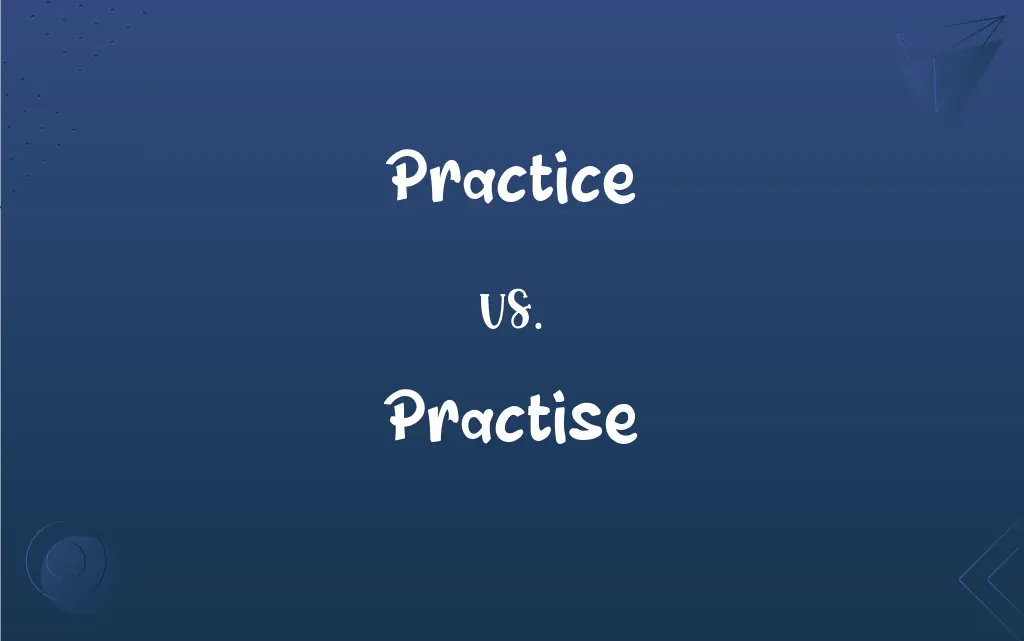Practice vs. Practise: What's the Difference?
Edited by Janet White || By Harlon Moss || Updated on October 17, 2023
In American English, "practice" is used for both noun and verb forms. In British English, "practice" is the noun and "practise" is the verb.

Key Differences
In American English, there isn't a distinction between "practice" and "practise"; both forms denote the noun and verb. However, in British English, this is not the case. "Practice" serves as the noun, implying a routine or repeated action, while "practise" is the verb indicating the act of doing something repeatedly to improve skill.
"Practice" in American English can be utilized in sentences like, "The doctor opened his practice" or "I have a practice of meditating every morning." In contrast, British English restricts "practice" to noun instances, like the establishment of a doctor or a routine. "Practise", on the other hand, is reserved for verb actions, such as, "I need to practise my piano scales."
The distinction between "practice" and "practise" in British English is essential for accurate communication. If one were to say, "I have a dental practice," it denotes ownership or association with a dental establishment. But saying, "I practise dentistry," conveys the act of performing dental procedures.
To summarize, while American English utilizes "practice" for both noun and verb meanings, British English distinguishes the two with "practice" for the noun and "practise" for the verb. This distinction plays a pivotal role in ensuring clarity in British communication.
Comparison Chart
Usage in US
Used for both noun and verb.
Not commonly used.
ADVERTISEMENT
Usage in UK
Used as a noun (e.g., a medical practice).
Used as a verb (e.g., to practise playing guitar).
Part of Speech
Noun in both UK and US. Verb in the US.
Verb in the UK.
Example (Noun)
"She joined the law practice."
N/A
Example (Verb)
"I practice the violin daily." (US usage)
"I practise the violin daily." (UK usage)
Practice and Practise Definitions
Practice
The exercise of a profession.
He started his medical practice right after graduation.
ADVERTISEMENT
Practise
To carry out or perform a particular action.
They practise caution when traveling.
Practice
A customary or habitual action.
It's good practice to check the oil level in your car regularly.
Practise
To train or drill oneself in preparation for something.
The team will practise tomorrow at 5 pm.
Practice
The regular performance of an activity to improve skill.
She made it a practice to read for an hour every night.
Practise
To engage in religious or spiritual exercises.
He practises meditation daily.
Practice
The actual application of an idea.
The theory sounds good, but in practice, it's more complicated.
Practise
To work at or pursue a particular profession.
He decided to practise law.
Practice
A place where professional services are provided.
She opened her own dental practice.
Practise
To perform an activity or exercise regularly to improve one's proficiency.
She will practise her speech before presenting.
Practice
To do or perform habitually or customarily; make a habit of
Practices courtesy in social situations.
Practise
Variant of practice.
Practice
To do or perform (something) repeatedly in order to acquire or polish a skill
Practice a dance step.
Practise
(transitive) To repeat (an activity) as a way of improving one's skill in that activity.
You should practise playing piano every day.
FAQs
Is "practise" commonly used in American English?
No, in American English, "practice" is predominantly used for both noun and verb forms.
How is "practice" used in American English?
In American English, "practice" can be both a noun and a verb.
How would you use "practise" in a sentence as a verb in British English?
"She needs to practise her guitar chords."
Is there a difference between "practice" and "practise"?
Yes, in British English, "practice" is a noun and "practise" is a verb, but in American English, "practice" is used for both noun and verb forms.
How would you use "practice" in a sentence as a noun?
"The dental practice was located downtown."
What does "practise" mean in British English?
"Practise" is a verb in British English meaning to perform an activity or exercise regularly to improve skill.
Can Americans use "practise" as a verb?
While "practise" exists, Americans predominantly use "practice" for both noun and verb forms.
In British English, can "practice" be used as a verb?
No, in British English, "practice" is exclusively a noun.
Can you give an example of "practice" as a customary action?
"Wearing seatbelts in cars is a good practice."
What does "practice" mean in American English?
"Practice" can mean the regular performance of an activity, the exercise of a profession, a customary action, a place of professional service, or the actual application of an idea.
What is a synonym for "practice" when referring to the exercise of a profession?
"Profession" or "vocation."
How is "practise" pronounced compared to "practice"?
They're generally pronounced the same, though some might slightly emphasize the "s" sound in "practise."
In which English-speaking countries is British English typically used?
Countries like the UK, Australia, New Zealand, and South Africa typically use British English forms.
Is "practise" considered incorrect in American English?
It's not inherently incorrect, but it's less common and might be viewed as a British spelling.
Is it essential to distinguish between "practice" and "practise" in writing?
In American English, it's not crucial since "practice" is used for both forms. But in British English, distinguishing between the two is essential for clarity.
How do I know when to use "practice" or "practise" in British English?
Use "practice" as a noun and "practise" as a verb.
Can "practice" refer to a place?
Yes, like in "doctor's practice" referring to a doctor's office or clinic.
Why is there a difference between British and American English in terms of these words?
Language evolves over time and regions, leading to variations in spelling and usage between British and American English.
Are there other English words with similar variations between American and British English?
Yes, like "advice" (noun) and "advise" (verb) in both forms of English.
Can I use "practice" as a verb in British English?
No, in British English, you should use "practise" as the verb.
About Author
Written by
Harlon MossHarlon is a seasoned quality moderator and accomplished content writer for Difference Wiki. An alumnus of the prestigious University of California, he earned his degree in Computer Science. Leveraging his academic background, Harlon brings a meticulous and informed perspective to his work, ensuring content accuracy and excellence.
Edited by
Janet WhiteJanet White has been an esteemed writer and blogger for Difference Wiki. Holding a Master's degree in Science and Medical Journalism from the prestigious Boston University, she has consistently demonstrated her expertise and passion for her field. When she's not immersed in her work, Janet relishes her time exercising, delving into a good book, and cherishing moments with friends and family.































































